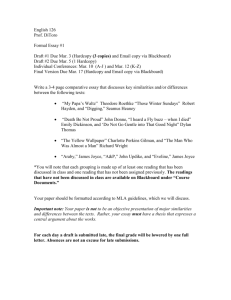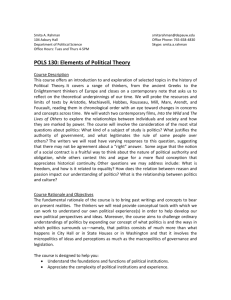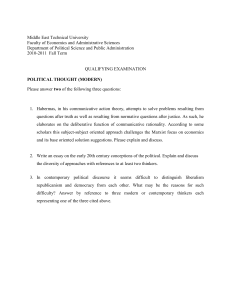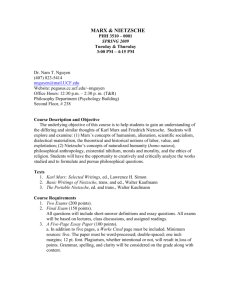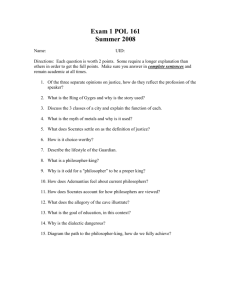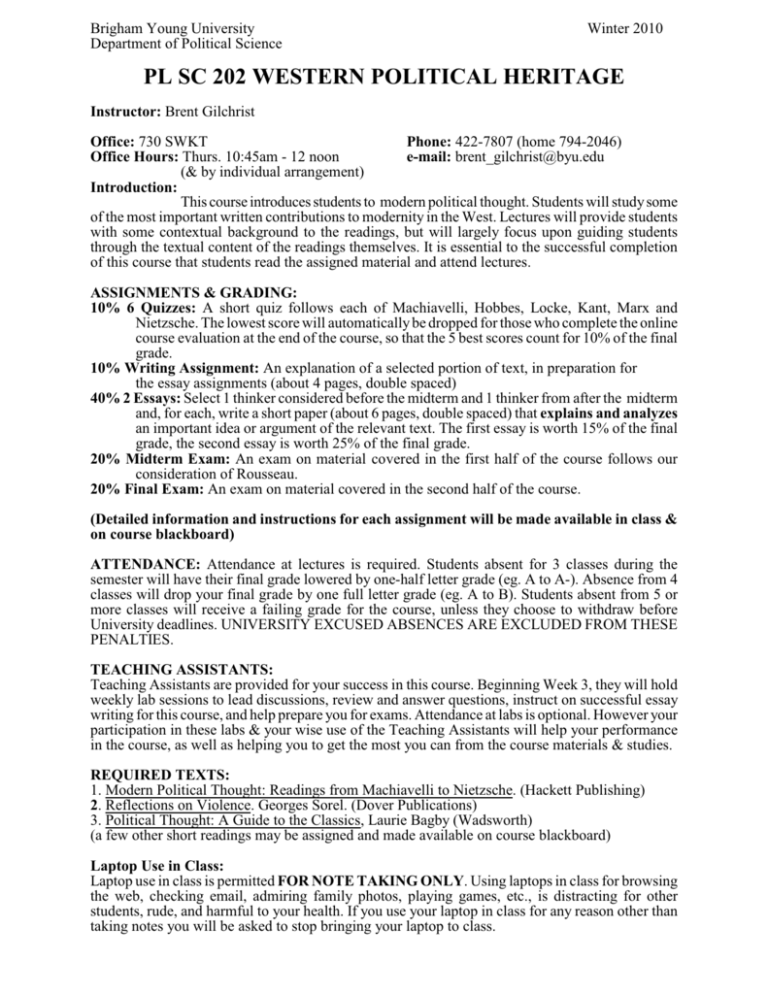
Brigham Young University
Department of Political Science
Winter 2010
PL SC 202 WESTERN POLITICAL HERITAGE
Instructor: Brent Gilchrist
Office: 730 SWKT
Phone: 422-7807 (home 794-2046)
Office Hours: Thurs. 10:45am - 12 noon
e-mail: brent_gilchrist@byu.edu
(& by individual arrangement)
Introduction:
This course introduces students to modern political thought. Students will study some
of the most important written contributions to modernity in the West. Lectures will provide students
with some contextual background to the readings, but will largely focus upon guiding students
through the textual content of the readings themselves. It is essential to the successful completion
of this course that students read the assigned material and attend lectures.
ASSIGNMENTS & GRADING:
10% 6 Quizzes: A short quiz follows each of Machiavelli, Hobbes, Locke, Kant, Marx and
Nietzsche. The lowest score will automatically be dropped for those who complete the online
course evaluation at the end of the course, so that the 5 best scores count for 10% of the final
grade.
10% Writing Assignment: An explanation of a selected portion of text, in preparation for
the essay assignments (about 4 pages, double spaced)
40% 2 Essays: Select 1 thinker considered before the midterm and 1 thinker from after the midterm
and, for each, write a short paper (about 6 pages, double spaced) that explains and analyzes
an important idea or argument of the relevant text. The first essay is worth 15% of the final
grade, the second essay is worth 25% of the final grade.
20% Midterm Exam: An exam on material covered in the first half of the course follows our
consideration of Rousseau.
20% Final Exam: An exam on material covered in the second half of the course.
(Detailed information and instructions for each assignment will be made available in class &
on course blackboard)
ATTENDANCE: Attendance at lectures is required. Students absent for 3 classes during the
semester will have their final grade lowered by one-half letter grade (eg. A to A-). Absence from 4
classes will drop your final grade by one full letter grade (eg. A to B). Students absent from 5 or
more classes will receive a failing grade for the course, unless they choose to withdraw before
University deadlines. UNIVERSITY EXCUSED ABSENCES ARE EXCLUDED FROM THESE
PENALTIES.
TEACHING ASSISTANTS:
Teaching Assistants are provided for your success in this course. Beginning Week 3, they will hold
weekly lab sessions to lead discussions, review and answer questions, instruct on successful essay
writing for this course, and help prepare you for exams. Attendance at labs is optional. However your
participation in these labs & your wise use of the Teaching Assistants will help your performance
in the course, as well as helping you to get the most you can from the course materials & studies.
REQUIRED TEXTS:
1. Modern Political Thought: Readings from Machiavelli to Nietzsche. (Hackett Publishing)
2. Reflections on Violence. Georges Sorel. (Dover Publications)
3. Political Thought: A Guide to the Classics, Laurie Bagby (Wadsworth)
(a few other short readings may be assigned and made available on course blackboard)
Laptop Use in Class:
Laptop use in class is permitted FOR NOTE TAKING ONLY. Using laptops in class for browsing
the web, checking email, admiring family photos, playing games, etc., is distracting for other
students, rude, and harmful to your health. If you use your laptop in class for any reason other than
taking notes you will be asked to stop bringing your laptop to class.
JAN.5
Course Introduction
Machiavelli’s The Prince introductory remarks
JAN.7
JAN.12
Machiavelli’s The Prince: 1-6 pp.9-18
GUIDE pp.48-54, 60-61
JAN.14 MACHIAVELLI QUIZ OPEN UNTIL SUNDAY 12AM
Machiavelli’s The Prince: 7-14 pp.18-33
Machiavelli’s The Prince: 15-26 pp.33-52
GUIDE pp.57-60, 62-63
JAN.19
GUIDE pp.54-56, 63-65
JAN.21
Hobbes’s Leviathan: Introduction, 1-6 pp.116-136
GUIDE pp.66-71, 75-76
JAN.26
Hobbes’s Leviathan: 11-15 pp.152-171
GUIDE pp.76-77
JAN.28 HOBBES QUIZ OPEN UNTIL SUNDAY 12AM
Hobbes’s Leviathan: 16-21 pp.171-193
GUIDE pp.77-78
FEB.2
Locke’s Second Treatise of Government:
Preface, Chs.1-3 pp.285-292
GUIDE pp.86-91, 99-100
FEB.4 LOCKE QUIZ OPEN UNTIL SUNDAY 12AM
Locke’s Second Treatise of Government:
Ch.5 pp.292-299
GUIDE p.100
FEB.9 FIRST WRITING ASSIGNMENT DUE TODAY
Locke’s Second Treatise of Government: Chs.7-12
pp.306-326; Chs.18-19 pp.340-353
GUIDE pp.101-104
FEB.11
Rousseau’s First Discourse (on blackboard)
GUIDE pp.112-119, 124-126
FEB.16
Rousseau’s Second Discourse, Part 1: pp.371-395
GUIDE pp.119-122, 126-131
FEB.18
MONDAY INSTRUCTION
FEB.23
Rousseau’s Second Discourse, Part 2: pp.395-410
GUIDE pp.131-133
FEB.25 (Midterm Exam opens, closes Mar.1 1pm)
Rousseau’s Social Contract, 1&2: pp.427-449
GUIDE pp.133-139
MAR.2
Rousseau’s Social Contract, 3&4: pp.449-487
GUIDE pp.139-147
MAR.4 KANT QUIZ OPEN UNTIL SUNDAY 12AM
Kant, “What is Enlightenment?”
Kant, “Contest of Faculties” (blackboard)
GUIDE pp.170-175, 179-180
MAR.9 FIRST ESSAY DUE TODAY
Kant, “Contest of Faculties” (blackboard)
Kant, “Idea for a Universal History” (blackboard)
GUIDE pp.176-178, 180-182
MAR.11
Hegel, (optional reading in text pp.714-741)
Marx, The Communist Manifesto, 1&2: pp.798-809
MAR.16
Marx, The Communist Manifesto, 1&2: pp.798-809
GUIDE pp.188-200 205-206
MAR.18 MARX QUIZ OPEN UNTIL SUNDAY 12AM
Marx, The Communist Manifesto, 3&4: pp.809-815
Marx, “Alienated Labor”: pp.766-772
GUIDE pp.206-211, 200-202
MAR.23
Nietzsche For and Against: pp.858-864
Nietzsche, Genealogy of Morals; Preface, First
Essay: pp.865-884
MAR.25
Nietzsche, Genealogy of Morals; First Essay:
pp.869-884
MAR.30
Sorel, Reflections on Violence:
“Letter to Daniel Halevy”
APR.1 NIETZSCHE & SOREL QUIZ UNTIL SUNDAY 12AM
Sorel, Reflections on Violence:
“Introduction,” Ch.2.2, Ch.3.4, Ch.4
APR.6 SECOND ESSAY DUE TODAY
Emma Goldman – FILM
Emma Goldman – FILM Discussion
APR.13
Sorel, Reflections on Violence: Ch.7
Camus, “The Myth of Sisyphus” (blackboard)
FINAL EXAMS
APR.8
Sorel, Reflections on Violence:
Ch.5.2, Ch.6.4, Ch. 5.3-5.4
PLEASE NOTE:
Preventing Sexual Harassment
Title IX of the Education Amendments of 1972 prohibits sex discrimination against any participant in an
educational program or activity that receives federal funds. The act is intended to eliminate sex
discrimination in education. Title IX covers discrimination in programs, admissions, activities, and
student-to-student sexual harassment. BYU's policy against sexual harassment extends not only to
employees of the University but to students as well. If you encounter unlawful sexual harassment or
gender-based discrimination, please talk to your professor; contact the Equal Employment Office at
422-5895 or 367-5689 (24-hours); or contact the Honor Code Office at 422-2847.
Students with Disabilities
Brigham Young University is committed to providing a working and leaming atmosphere that
reasonably accommodates qualified persons with disabilities. If you have any disability that may impair
your ability to complete this course successfully, please contact the University Accessibility Center
(422-2767). Reasonable academic accommodations are reviewed for all students who have qualified
documented disabilities. Services are coordinated with the student and instructor by the UAC. If you
need assistance or if you feel you have been unlawfully discriminated against on the basis of disability,
you may seek resolution through established grievance policy and procedures. You may contact the
Equal Employment Office at 422-5895, D-282 ASB.

